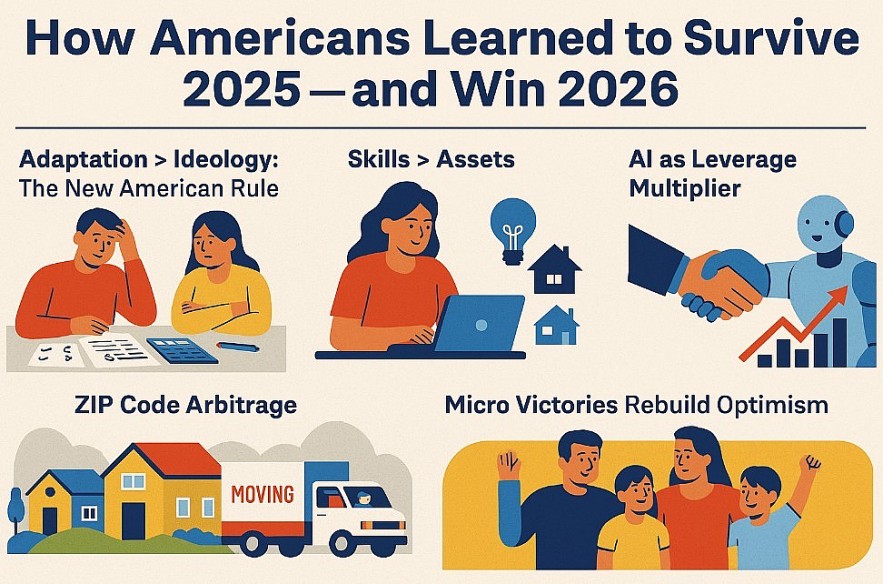How Americans Learned to Survive 2025 — and Win 2026
The Year When Survival Became Strategy
The United States didn’t collapse in 2025.
It recalibrated.
The year looked stable on paper—GDP was positive, unemployment hovered near 4%, and inflation cooled to below 3%. Economists congratulated one another. Federal Reserve officials spoke in polite paragraphs about “soft landings.”
But everyday Americans didn’t live in reports. They lived in kitchens, grocery aisles, emergency rooms, rental applications, and online job portals. They discovered something brutal:
The economy may have recovered, but the people had not.
2025 was the year Americans stopped waiting for the system to fix itself.
They adapted. They migrated. They built side businesses.
They learned to play offense, not defense.
And this—far more than elections or stock indexes—is what will define 2026.
Read more: America in 2025: The Ten Moments That Changed Everything
 |
| The Year When Survival Became Strategy |
Adaptation > Ideology: The New American Rule
For most of the 2000s and 2010s, Americans believed in big frameworks.
Party platforms. Corporate ladders. Retirement plans.
“Follow the rules and eventually it will work out.”
That faith cracked in 2025.
Inflation cooled—but prices didn’t drop.
Wages rose—but rent rose faster.
The economy reopened—yet families still lived paycheck to paycheck.
People stopped asking “Who is to blame?” and started asking
“What do I do?”
This mindset shift was not philosophical. It was survival instinct.
The Collapse of “Waiting for Solutions”
Many Americans waited through:
-
the pandemic era
-
supply chain disruptions
-
interest rate spikes
-
the Great Resignation
-
the housing bubble’s second wind
They waited for things to go “back.”
They learned there was no back.
2025 replaced ideology with adaptation:
-
less political loyalty
-
fewer tribal economic arguments
-
fewer “moralized” financial choices
-
more ruthlessly practical decisions
Americans discovered that fixing life was not a debate topic—
it was a tactical operation.
Skills > Assets: The End of the Passive Middle Class
 |
| For decades, the American dream was built on ownership |
For decades, the American dream was built on ownership:
A house + a college degree + a professional job = stability.
2025 exposed the fatal flaw:
Assets are no longer guarantees—skills are.
The $100k Illusion
Professionals earning six figures discovered the truth:
-
$2,800 rent
-
$600 car payment
-
$200+ insurance
-
student debt
-
childcare
-
taxes
-
groceries
These costs didn’t leave enough room to breathe—let alone invest.
A salary was no longer a safety net.
It was a treadmill.
The New Skill Hierarchy
The winners of 2025 weren’t richer; they were skill-dense:
-
Teachers who became content creators
-
Accountants who trained AI to do bookkeeping
-
Nurses who built telehealth micro-practices
-
Mechanics who monetized repair tutorials
-
Graphic designers who used AI to deliver 10x volume
The formula changed:
Time × Skill × Technology > Role × Degree × Loyalty
Americans finally understood that:
-
Employers don’t offer permanence
-
Credentials don’t equal mobility
-
Loyalty is not rewarded—output is
Skills created leverage.
Assets merely created pressure.
ZIP Code Arbitrage: The Quiet Migration That Rewired America
The most powerful economic phenomenon of 2025 wasn’t Wall Street.
It was U-Haul trucks.
Americans left prestige cities in waves:
-
California → Texas / Nevada / Utah
-
New York → Florida / North Carolina
-
Illinois → Tennessee / South Carolina
Not because of ideology.
Because of arithmetic.
They didn’t move to chase culture.
They moved to chase purchasing power.
The Geography of Survival
Two truths emerged:
-
America is not one country.
-
Your future is determined by your ZIP code.
In Boston, a $95k salary feels like failure.
In Knoxville, it feels like freedom.
In San Francisco, daycare costs $2,200 a month.
In Raleigh, it costs less than half.
In downtown Los Angeles, families squeeze into 900 sq. ft.
In Tulsa, they live in 2,800 sq. ft. for less rent.
Geographic arbitrage isn’t an economic theory.
It’s a lived strategy.
People moved where their labor meant something.
AI as a Leverage Multiplier — Not a Threat
 |
| How can AI be part of my income |
2025 was the year Americans stopped asking,
“Will AI take my job?”
and began asking,
“How can AI be part of my income?”
The divide was brutal:
-
AI operators multiplied their output and income.
-
AI spectators stagnated.
The Automation Tipping Point
AI didn’t eliminate entire industries.
It eliminated the middle layer: coordinators, editors, interns, junior analysts.
It didn’t replace blue-collar labor.
It replaced process and bureaucracy.
In small businesses:
-
AI handled scheduling
-
AI wrote invoices and emails
-
AI built marketing funnels
-
AI performed customer service
-
AI designed ad creatives
What used to require six employees required two plus a software stack.
The Solo Enterprise Revolution
The greatest winners were micro-entrepreneurs.
A single person with:
-
A niche skill
-
An online presence
-
3–5 AI agents
-
A payment gateway
…suddenly operated like a miniature company.
Americans realized:
AI is a tool for leverage, not a philosophical debate.
The question was no longer whether AI is ethical.
It was whether you could afford not to use it.
The Practical Roadmap for Families in 2026
This is the most important section.
Economic commentary is only useful when it becomes actionable.
Here is the new playbook for the survival economy.
1. Downsize the Cost of Living, Not the Quality of Life
Stop optimizing for prestige addresses.
Start optimizing for psychological margin.
A family that moves from Boston to Raleigh may:
-
Spend less on housing
-
Save more per month
-
Work fewer hours
-
Actually see their children
-
Build emergency reserves
-
Start a small business
Freedom is measured in breathing room.
2. Automate the Boring — Personal and Professional
Household automation:
-
Budget trackers
-
Grocery planners
-
AI meal prep
-
Bill reminders
-
Healthcare portals
Work automation:
-
CRM bots
-
Lead generation
-
Proposal writing
-
Content engines
-
Intake forms
-
Appointment scheduling
Every hour reclaimed is income potential.
3. Treat Jobs as Auctions, Not Loyalty Oaths
The era of:
“Stay and climb”
has been replaced by:
“Learn and leap.”
In 2026:
-
Workers will average 12–18 month stints
-
Companies will contract, not hire
-
Skills will outpace titles
-
Networks will outperform resumes
Do not wait for promotions.
Reposition yourself.
4. Create Micro-Businesses, Not Big Dreams
Forget “build a startup.”
Think: $1,500 per month revenue stream.
Examples:
-
Remote tutoring + AI curriculum
-
Fitness coaching + community Discord
-
Auto repair content + affiliate tools
-
Etsy digital products + TikTok
-
Bookkeeping niche + AI automation
-
Local handyman + SMS scheduling
The goal is not unicorn valuation.
The goal is unicorn resilience.
Just one additional income stream changes everything:
-
Budget
-
confidence
-
sleep
-
marriage
-
parenting
-
retirement
How Micro Victories Rebuild Optimism
In 2025, Americans discovered something counterintuitive:
Happiness didn’t come from massive goals.
It came from small wins.
Small wins that changed entire lives:
-
A couple paid off a $9,400 credit card through side gigs
-
A woman went from 65-hour corporate job to 35-hour remote role
-
A veteran moved from Chicago to Knoxville and bought a home
-
A Gen Z programmer automated his freelance pipeline and doubled income
-
A teacher monetized lesson plans online
-
A mechanic started a YouTube channel and gained his first 5,000 subscribers
None of these were explosions of wealth.
They were restorations of agency.
The American Dream didn’t disappear.
It downsized to match reality.
Instead of “Become rich,” it became:
-
Become safe
-
Become flexible
-
Become autonomous
-
Become debt-free
-
Become respected
And that is healthier.
Conclusion: The New Rules of Winning 2026
2025 did not break America.
It rewired it.
The old formula:
-
Work → Save → Buy → Retire
is dead.
The new formula:
Adapt → Migrate → Automate → Monetize → Stabilize
Not everyone will succeed.
But everyone can play.
To win 2026, Americans must understand:
1. Adaptation beats ideology.
Stop waiting for institutions.
2. Skills beat assets.
Housing markets change.
Education debt doesn’t.
3. Geography is leverage.
Move where your time is worth more.
4. AI is the new workforce.
You either deploy it—or get replaced by someone who does.
5. Micro-victories are the foundation of hope.
You don’t need a miracle.
You need momentum.
And in that momentum—
America finally finds peace.























